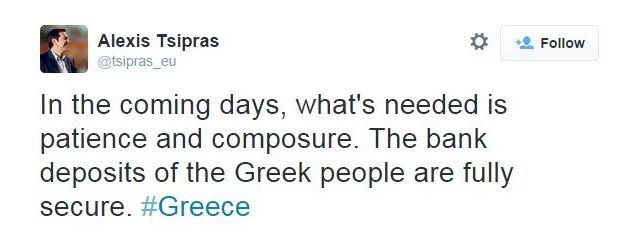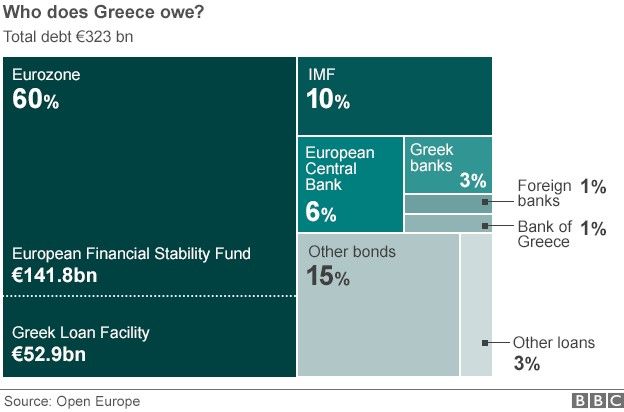1. 유럽 채권단, 트로이카 (유럽중앙은행, 유럽연합, 국제통화기금 IMF)와 그리스 시리자 정부 협상 결렬 일지
6월 26일 (금) 저녁 : 그리스 시리자 정부 총리 치프라스, 트로이카 신규 구제금융안에 대한 그리스 국민투표 실시 발표
6월 27일 (토) 오후 : 유로그룹, 유럽 재무장관회의, 다음 주 화요일 (6월 30일 마감) 이후로 현행 구제금융 연장해 줄 수 없다고 발표
6월 27일 (토) 저녁: 그리스 의회 7월 5일 국민투표 실시 통과 (찬성: 시리자, 그리스 독립당, 황금새벽당)
6월 28일 (일) 오후 : 유럽중앙은행 (ECB)은 그리스에 긴급유동성 지원 (ELA) 증액 거부
6월 28일 (일) 저녁: 그리스 정부 발표. 은행 영업 중지 (6월 29일~7월 6일) 및 예금은 1일 60유로로 한정 인출 가능.
2.유럽채권단 트로이카 공방전
유로그룹은 그리스가 협상을 깨버렸다고 비난.
6월 28일 일요일, 유럽연합집행위 (EC) 유럽채권단 제안서를 발표.
이에 대해서 그리스 시리자 정부는 현재 유럽그룹과의 협상은 7월 5일 국민투표 이후에 재개되어야 한다고 발표. 그리스 정부의 구제금융 종료 시한 연정 요청을 트로이카가 거부한다면, 이는 유럽 민주주의 훼손이자, 그리스 주권을 무시하는 처사라고 비판.
3. 그리스 시리자 정부 총리, 알렉시스 치프라스 트위터
"지금부터 국민여러분이 해주셔야 할 것은, '차분히 기다려주시는 것'입니다. 여러분의 예금은 은행에 안전하게 보관되어 있습니다"
그리스 시리자 청년그룹 : 7월 5일 국민투표에서, 트로이카 채권단의 제안서를 '거부 NO'할 것을
주장하고 있다.
자본통제 내용
i
.
Greek debt crisis: Banks to remain shut all week
- 1 hour ago
- Europe
The Greek government has confirmed that banks will be closed all week, after a decision by the European Central Bank not to extend emergency funding.
In a decree, it cited the "extremely urgent" need to protect the financial system due to the lack of liquidity.
Cash withdrawals will be limited to €60 (£42; $66) a day for this period, the decree says.
Athens is due to make a €1.6bn payment to the IMF on Tuesday - the same day that its current bailout expires.
In reaction to the crisis, the London, Paris and Frankfurt stock markets fell sharply in early trading on Monday, following similar falls in Asia.
The euro lost 2% of its value against the the US dollar. Government borrowing costs in Italy and Spain, two of the eurozone's weaker economies, have also risen.
Talks between Greece and the eurozone countries over bailout terms ended without an agreement on Saturday, and Prime Minister Alexis Tsipras then called a surprise referendum on the issue to be held on 5 July.
Greece risks default and moving closer to a possible exit from the 19-member eurozone.
'Not viable'
The decree was published in the official government gazette after the Greek cabinet took the decision late on Sunday.
The document said the measures - including the shutting down of the Athens stock exchange on Monday - were agreed as a result of the eurozone's decision "to refuse the extension of the loan agreement with Greece".
The €60 restriction on withdrawals will not apply to holders of foreign bank cards.
Mr Tsipras also said that Greek deposits were safe.

Greeks have been queuing to withdraw money from cash machines over the weekend, leaving a number of ATMs dry.
However, the decree said that the cash machines would "operate normally again by Monday noon at the latest".

Days of turmoil
- Friday evening: Greek prime minister calls referendum on terms of new bailout deal, asks for extension of existing bailout
- Saturday afternoon: eurozone finance ministers refuse to extend existing bailout beyond Tuesday
- Saturday evening: Greek parliament backs referendum for 5 July
- Sunday afternoon: ECB says it is not increasing emergency assistance to Greece
- Sunday evening: Greek government says banks to be closed for the week and cash withdrawals restricted to €60

Eurozone finance ministers blamed Greece for breaking off the talks, and the European Commission took the unusual step on Sunday of publishing proposals by European creditors that it said were on the table at the time.
But Greece described creditors' terms as "not viable", and asked for an extension of its current deal until after the vote was completed.
"[Rejection] of the Greek government's request for a short extension of the programme was an unprecedented act by European standards, questioning the right of a sovereign people to decide," Mr Tsipras on Sunday said in a televised address.
He also said he had sent a new request for an extension to the bailout. "I am awaiting their immediate response to a fundamental request of democracy," he added.

Analysis: Robert Peston, BBC economics editor
The temporary closure of banks in Greece, and the introduction of capital controls, is very bad news for Greece. Greek people will have less money to spend and business less to invest; so an already weak economy will probably return to deep recession.
As for the impact on the rest of the eurozone, corporate treasurers and wealthy individuals will wake up on Monday wondering if their money is safe in the banks of other weaker eurozone economies.
Greece's bank holiday from hell

The current ceiling for the ECB's emergency funding - Emergency Liquidity Assistance (ELA) - is €89bn (£63bn). It is thought that virtually all that money has been disbursed.
The ECB was prepared to risk restricting ELA because the failure of the bailout talks cast new doubt on the viability of Greek banks - some of their assets depend on the government being able to meet its financial commitments, the BBC economics correspondent Andrew Walker reports.
He adds that it is a fundamental principle of central banking that while you do lend to banks that are in temporary difficulty, you do so only if they are solvent.


Are you in Greece? Are you affected by the issues in this story? What are your hopes and fears for the economy? You can share your experiences by emailing haveyoursay@bbc.co.uk.
'정책비교 > 국제정치' 카테고리의 다른 글
| 독일 재무장관 쇼이블레와 총리 메르켈과 은근한 불화설 (0) | 2015.07.12 |
|---|---|
| 그리스 국가 채무 위기, 골드만 삭스 공격은 어떠했는가 (사진) (0) | 2015.07.08 |
| 독일 좌파당, 기지 Gysi 의회 연설문, 메르켈과 사민당 가브리엘의 이중잣대 비판하다 (0) | 2015.07.05 |
| 그리스 시리자 치프라스, 트로이카 '긴축' 국민투표 연설문 전문 (0) | 2015.06.28 |
| 류 후민, 마오의 사진 작가, 87세 일기로 운명하다 (0) | 2015.03.24 |
| 시리자 - 트로이카 제 2라운드, 나치 전쟁범죄 보상비, 3320억 유로 (430조) 보상하라 ! (0) | 2015.03.22 |
| 그리스 시리자, 신자유주의 폭풍 뚫을 수 있나? [시리자 특집 ①] 유로그룹과의 2월 20일 '합의안' 평가 전망 (0) | 2015.03.17 |





